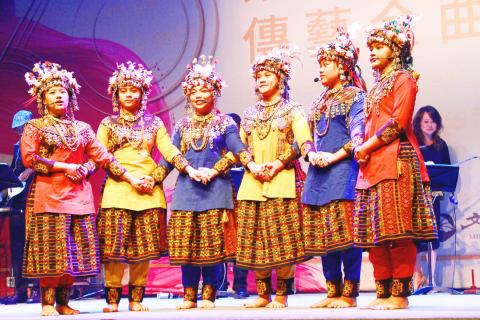A country’s level of democracy is reflected in the development of its performing arts, Deputy Minister of Culture Hsiao Tsung-huang (蕭宗煌) said yesterday, ahead of the 30th Golden Melody Awards for Traditional Arts and Music in Taipei on Aug. 10.
The arts are the most important aspect of a nation’s soft power and traditional arts are the essence of its culture, Hsiao said.
“In Taiwan, we have cultural heritage from China, Japan, the Netherlands, Spain and Portugal, which has produced a melting pot of cultures and acceptance of them,” Hsiao said. “Against that background, we can see great diversity in traditional arts in Taiwan.”

Photo: CNA
The development of a country’s performing arts reflects its level of democracy, he said.
The awards honor artists, groups and works that have contributed to Taiwan’s diverse, creative and rich cultural heritage, organizers said.
“Artists, promoters and people who work in the traditional and cultural performing arts” will be among the winners, National Center for Traditional Arts director Chen Chi-ming (陳濟民) said.
The Taipei Philharmonic Chamber Choir’s album Image Taiwan II has been nominated for six awards — best cover art, best performance, best recording, best composition, best lyrics and best producer.
The theater production The Cursed Royal Family by the Tang Mei-yun Taiwanese Opera Company has been nominated for best ensemble performance, best script, best actor and best music design.
Singing Organ in the Rainy Night by Gwhyenth Chen (陳毓襄) has been nominated for best art music album, best album producer, best recording, best musical performance and best arrangement.
Sound engineer Yeh Chwei-ching (葉垂青) and playwright Wang An-chi (王安祈) will receive special awards for their “contributions and achievements in the fields of traditional and artistic audio publishing, and theatrical performing arts respectively,” the Ministry of Culture said.
In 2014, the event was separated from the Golden Melody Awards and have since been run by the National Center for Traditional Arts.

Taiwan is to commence mass production of the Tien Kung (天弓, “Sky Bow”) III, IV and V missiles by the second quarter of this year if the legislature approves the government’s NT$1.25 trillion (US$39.78 billion) special defense budget, an official said yesterday. Commenting on condition of anonymity, a defense official with knowledge of the matter said that the advanced systems are expected to provide crucial capabilities against ballistic and cruise missiles for the proposed “T-Dome,” an advanced, multi-layered air defense network. The Tien Kung III is an air defense missile with a maximum interception altitude of 35km. The Tien Kung IV and V

The disruption of 941 flights in and out of Taiwan due to China’s large-scale military exercises was no accident, but rather the result of a “quasi-blockade” used to simulate creating the air and sea routes needed for an amphibious landing, a military expert said. The disruptions occurred on Tuesday and lasted about 10 hours as China conducted live-fire drills in the Taiwan Strait. The Civil Aviation Administration (CAA) said the exercises affected 857 international flights and 84 domestic flights, affecting more than 100,000 travelers. Su Tzu-yun (蘇紫雲), a research fellow at the government-sponsored Institute for National Defense and Security Research, said the air

A strong continental cold air mass is to bring pollutants to Taiwan from tomorrow, the Ministry of Environment said today, as it issued an “orange” air quality alert for most of the country. All of Taiwan except for Hualien and Taitung counties is to be under an “orange” air quality alert tomorrow, indicating air quality that is unhealthy for sensitive groups. In China, areas from Shandong to Shanghai have been enveloped in haze since Saturday, the ministry said in a news release. Yesterday, hourly concentrations of PM2.5 in these areas ranged from 65 to 160 micrograms per cubic meter (mg/m³), and pollutants were

Taiwan lacks effective and cost-efficient armaments to intercept rockets, making the planned “T-Dome” interception system necessary, two experts said on Tuesday. The concerns were raised after China’s military fired two waves of rockets during live-fire drills around Taiwan on Tuesday, part of two-day exercises code-named “Justice Mission 2025.” The first wave involved 17 rockets launched at 9am from Pingtan in China’s Fujian Province, according to Lieutenant General Hsieh Jih-sheng (謝日升) of the Office of the Deputy Chief of the General Staff for Intelligence at the Ministry of National Defense. Those rockets landed 70 nautical miles (129.6km) northeast of Keelung without flying over Taiwan,